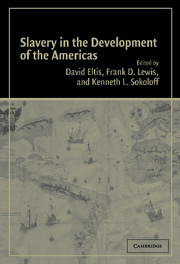Book contents
- Frontmatter
- Contents
- Appreciation: Stanley L. Engerman and Slavery
- Introduction
- PART I ESTABLISHING THE SYSTEM
- PART II PATTERNS OF SLAVE USE
- PART III PRODUCTIVITY CHANGE AND ITS IMPLICATIONS
- PART IV IMPLICATIONS FOR DISTRIBUTION AND GROWTH
- 9 Wealth Accumulation in Virginia in the Century before the Civil War
- 10 The Poor: Slaves in Early America
- 11 The North–South Wage Gap before and after the Civil War
- The Writings of Stanley L. Engerman
- Contributors
- Index
11 - The North–South Wage Gap before and after the Civil War
Published online by Cambridge University Press: 18 August 2009
- Frontmatter
- Contents
- Appreciation: Stanley L. Engerman and Slavery
- Introduction
- PART I ESTABLISHING THE SYSTEM
- PART II PATTERNS OF SLAVE USE
- PART III PRODUCTIVITY CHANGE AND ITS IMPLICATIONS
- PART IV IMPLICATIONS FOR DISTRIBUTION AND GROWTH
- 9 Wealth Accumulation in Virginia in the Century before the Civil War
- 10 The Poor: Slaves in Early America
- 11 The North–South Wage Gap before and after the Civil War
- The Writings of Stanley L. Engerman
- Contributors
- Index
Summary
In the several decades preceding the Civil War the Southern economy grew at about the same pace as did the economy of the rest of the United States. In the immediate aftermath of the Civil War, per capita incomes fell sharply in the South, absolutely and relative to per capita incomes in the North. Although there was some recovery after the initial decline, Southern incomes remained persistently low relative to Northern incomes for the remainder of the nineteenth century – indeed, until well into the twentieth century. Measured in terms of per capita incomes, the impact of the Civil War on the Southern economy was both severe initially and protracted.
This chapter offers further assessment of the impact of the War on the Southern economy but in a way that has received relatively limited attention previously from economic historians. Specifically, I examine the evolution of wages in the South relative to the North, before and after the War. My analysis is based on wage evidence culled from various published and archival sources, reaching back into the ante-bellum period as early as the 1820s and extending (in some cases) to the end of the century.
There are several reasons why a study of the impact of the War on relative (South-to-North) wages is of value. One reason is that regional data on wages are available more frequently, in the temporal sense, than are estimates of per capita income.
- Type
- Chapter
- Information
- Slavery in the Development of the Americas , pp. 324 - 352Publisher: Cambridge University PressPrint publication year: 2004
- 2
- Cited by

